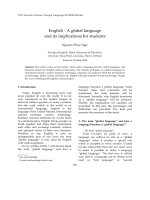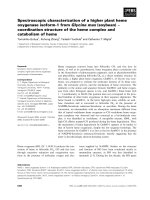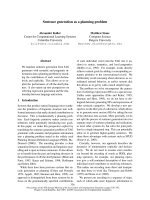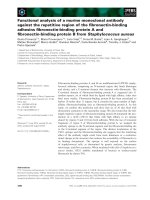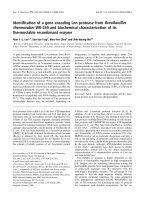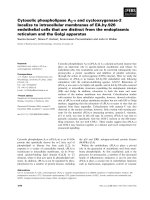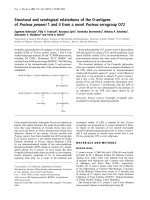Báo cáo " English today and tomorrow from a critical perspective " pptx
Bạn đang xem bản rút gọn của tài liệu. Xem và tải ngay bản đầy đủ của tài liệu tại đây (101.66 KB, 10 trang )
VNU Journal of Science, Foreign Languages 26 (2010) 196-205
196
English today and tomorrow from a critical perspective
Cao Duy Trinh*
College of Sciences, Thai Nguyen University,
Quyet Thang Commune, Thai Nguyen City, Vietnam
Received 4 September 2010
Abstract. Doing any critical analysis with English and English Language Teaching (ELT) requires
a critical examination of the language and related matters. First, the English language has a long
history of evolution and people all over the world have been speaking English as a first language,
second language or an important foreign language. The United Kingdom, its former colonies and
the United States of America are the starting points of the popular diffusion of English language.
Thus, they are either native speakers of English or competent English users. Secondly, nowadays,
English is used as an effective tool in various situations of international communication with
various "world Englishes". It also means there are different standards of English, including
metropolitan native norms and other local or regional norms. Last but not least, ELT, like other
kind of teaching, is not free from political connotations. We should recognize the political nature of
ELT for our actions. This paper presents a brief discussion of the present use of English and the
growing tendency of this language use. It also looks at the teaching of English language as a political
undertaking. On the ground, some ideas may be offered for a more in-depth critical analysis.
Keywords: Critical analysis, English language, native speakers of English, polictical nature of
ELT, world Englishes.
*
To think about what a critical analysis
should involve, we recall the introduction to
the Quartely Journal for Teachers of English to
Speakers of Other Languages and of Standard
English as a Second Dialect (TESOL), where
Alastair Pennycook, acting as an editor for the
works of critical approaches in English
language teaching, focused on three main
themes with these questions: the domain of
interest, a transformative pedagogy and a self-
reflexive stance on critical theory [1]. First, he
indicated that the domain had to do with
attempts to connect the microrelations (of
______
*
Tel.: 84-0280-3856215
E-mail:
TESOL) - classrooms, teaching approaches,
interactions - with broader social and political
relations. Secondly, with his "transformative
pedagogy”, he meant the methods of teaching
which might help to change the unequal
society. And thirdly, he talked about the
criticizing and self-criticizing jobs a critical
work should do by questioning the most taking-
for-granted assumptions in a society.
For me, to lay a foundation for a critical
analysis of the English language and English
Language Teaching (ELT), it seems necessary to
define critically the language itself, the native
speakers of the language and the politics of that
language education. Studying these will help us go
in the right direction of a work of critical analysis.
C.D. Trinh / VNU Journal of Science, Foreign Languages 26 (2010) 196-205
197
1. English language and native speakers of
English
The discussion of English language with its
increasing power is worthwhile.English is one
of about 4,000 languages all over the world. It
belongs to the Indo-European group and is the
largest Western language. According to A.C.
Baugh, T. Cable [2], English is spoken by
more than 380 million people in the UK, USA
and the former British Empire (whereas
Spanish is spoken by about 330 million people,
Portugese by 180 million, Russian by 175
million, German by 110 million, French by 80
million native speakers, Italian by 65 million).
Anyway, English is not the most popular native
language in the world in comparison with
Chinese, spoken in eight varieties, by about 1.3
billion people in China alone).
English is the first language of several
highly developed countries and it has become
more and more popular outside these countries.
R. Mesthrie, R.M. Bhatt [3] wrote about
"English language complex", about the
increasingly spread of English with varieties of
English in the world or 'World Englishes'. They
classified English standards and dilects into
metropolitan, colonial, regional, social, pidgin,
creole, second language, foreign language,
immigrant, language-shift, jargon, hybrid
Englishes. The metropolitant standards, the
standards of the "mother city/city-state" in
relation to its colonies, once has been applicable
to British English but today indicating at least
two standard varieties: British and American
English norms. Their formal models are
provided by the networks of radio and
television mainly in London, Washington, Los
Angeles and Atlanta. There are varieties of
English as a second language in the colonies
(e.g. Kenya, Sri Lanka and Nigeria) where
English is important for education and
government. English is used as a foreign
languages in the countries where there is no direct
influence of the British (and US) settlement where
English serves international purposes.
About "the native speakers of a language”
and "native speakers of English”, there are a lot
of debates. R. Mesthrie, R.M. Bhatt talked
about a traditional native speaker of a language
from birth with the automatic use and,
therefore, different from a non-native speaker
of a language. The non-native speaker does not
have the same automatic fluency of the
language in comparison with a native-speaker
one because that person only learns the second
or other language(s) after his or her mother
tounge. In other words, a speaker's native
language will acquire, store and use the dialect
from the crib incidentlly, implicitly and
automatically. However, they further added that
the above definition will be true only in mono-
lingual societies because a child, in some
societies of multilingualism, might speak
several native languages, where:
the order of acquisition not being an
indicator of ability. Multilingual speakers may
switch languages according to situation in a
way that monolingual speakers switch styles of
the same language"natively” (Scotton 1985).
The issue of nativeness, especially for
English language, is critically sensative and not
simply linguistic. The difference between
“nativeness” and “non-nativeness” may be
related to different attitudes of the speakers and
hearers. Pennycook [1] pointed out:
The notion of native and nonnative
speakers is interwoven with issues of race and
ethnicity, as one’s nativeness as a speaker of
English is often assumed to correlate with the
paleness of one’s skin.
Among the debates, however, Karchru’s
classification (figure 1) below appears to be
popular with scholars. The populations of the
five countries in the "Inner Circle" namely UK,
USA, Canada, Australia and New Zealand are
taken to be "the true native speakers" of
English. The argument is reasonable. First of
all, those people bear the hallmark of the native
speakers of English. An English or American
does not need to speak another "first language"
except English (British English or American
C.D. Trinh / VNU Journal of Science, Foreign Languages 26 (2010) 196-205
198
English respectively). The same is true for
people from Canada, Australia and New
Zealand. They only speak this first language as
their "mother or grandmother" British tounge.
Although these native speakers of English in
different countries do not share the same
economical, geographical, cultural or political
conditions, they have many characteristics in
common. Regardless of their today's
nationalities, their majority comes from the
same original root, Britain. A Singaporean may
speak English, Tamil, Chinese or Malay at the
same time, and nobody would regard them as
native speakers of English. Secondly, English
in these places are "pure and real English"
before they are mixed with any other kind of
languages. Only these countries will provide the
world with the best metropolitan standard
norms of English. Other English as a second
language, foreign language or local, colonial,
regional English will fail to meet this
requirement. Perhaps, this is part of the reasons
why the native speakers of English language
become 'hegemonic'. Thirdly, in a new phase, it
is the countries in the Inner circle, especially
USA and UK, as the native speakers of English,
acting as the elite leaders of the world in term
of economics, science and technologies and,
hence, politics and military. It is these countries
that are pushing the speed of the globalization
of English by official organizations and
documents, computers, banking, trading
products and by their foreign policies.
In short, the countries in the Inner Circle are
playing the primary roles in the growth of
English as providers of English standards
(British or American ones). In the Outer Circle
are the former colonies of Britain and USA
where English is additionally introduced for
education, law, administration, newspapers etc.
The Expanding Circle adopts English as
essential means of international
communication. Actually, only in the Outer
Circle and Expanding Circle, there are about
800 million people using English together with
other languages to communicate. The fact is
demanding an examination of the present use as
well as the future growth of this language.
Hkjk
C.D. Trinh / VNU Journal of Science, Foreign Languages 26 (2010) 196-205
199
Figure 1. Braj Kachru’s Circles model of World Englishes [3].
2. English today and in the future
More about same circles of World
Englishes, Yamuna Kachru and Larry E. Smith
[4] explained the diffusion of English
mechanism, a kind of ' chain reaction' with new
varieties, a process in which local multilingual
populations, in their turn, are spreading this
language. They showed that the use of English
in those three circles (two diaporas of English
in B. Krachu's words) related to the spread of
English worldwide. In the Inner Circle (the first
The 'Expanding Circle'
China 1,088,200,000
Egypt 50,273,000
Indonesia 175,904,000
Isarael 4,512,000
Japan 122,620,000
Korea 42,593,000
Nepal 18,004,000
Saudi Arabia 12,972,000
Taiwan 19,813,000
USSR 285,796,000
Zimbabwe 8,878,000
The 'Outer Circle'
Bangladesh 107,756,000
Ghana 13,754,000
India 810,806,000
Kenya 22,919,000
Malaysia 16,965,000
Nigeria 1
12,258,000
The 'Inner Circle'
USA 245,800,000
UK 57,006,000
Canada 25,880,000
Australia 16,470,000
New Zealand 3,366,000
C.D. Trinh / VNU Journal of Science, Foreign Languages 26 (2010) 196-205
200
Diapora), there is a population of a monolingual
English-speaking movement, responsible for
the introduction this language to new locations
(e.g. Australia, New Zealand, and North
America) from mother country. In the second
Diaspora (with other two Circles), this language
was again reintroduced to new places through
education, trades and missionary work. Kachru
Y. & Smith L.E said the main push for the
adoption and diffusion of English came from
the local multilingual populations. And the
language, once was established, was adapted to
new uses and nativilized in the new contexts.
In fact, since after the end of World War II,
English language use 'movement' has been
accelerating everywhere - not only in Europe
but also in Asia, Middle East, South America
and Africa. English has become language of
international official documents, news,
education, trade, technologies, sports,
entertainment and others (figure 2) [4].
Function Inner Circle Outer Circle Expanding Circle
Access code + + +
Advertising + +/– +/–
Corporate trade + + +
Development + +/– +/–
Government + +/– –
Linguistic impact + + +
Literary creativity + + +/–
Literary renaissance + + +
News broadcasting + + +/–
Newspapers + + +/–
Scientific higher education + + +/–
Scientific research + + +/–
Social interaction + +/– +/–
(+ signals use in the domain; – indicates no use in the domain; +/– points to the use of English along with
other languages in the domain.)
Figure 2. Functions of English in the Three Circles.
English is spreading and, anyway, it seems
that only English can play that role in the
'linguistic market place'. R. Mesthrie, R.M.
Bhatt [3] mentioned Truchot's statement that
the spread of English was as a consequence of
the internalization of society and globalization
of exchanges. The consequences was both
social, economic and linguistic. Due to its
superiority and advantages in terms of the
number of populations, economics, wide
colonial use, high technologies and the likes,
English is in the leading position that no other
languages can compete today. And R. Mesthrie,
R.M. Bhatt even went further to think of a
possible dominance of English in future:
In former times it was the brute force of
colonization and conquest that destroyed viable
language and cultural groupings in the
Americas and Australasia. It is doubtful that
economic globalization would have the same
catastrophic impact in Europe, Asia and Africa.
For this to be the case something like the
C.D. Trinh / VNU Journal of Science, Foreign Languages 26 (2010) 196-205
201
following stages would have to occur in an EFL
territory like Denmark or China:
English = English as a Foreign Language
the first foreign language English as a Second
Language The second first language the
first languge serving H functions sole first
language
(H here stands for the language or variety
deemed appropriate for use in 'High' domains,
like education and administration. [3])
For above reasons, R. Mesthrie, R.M. Bhatt
stressed that many people consider English to
be "a killer language” in its expansion. In fact,
people are using this language as an effective
tool of national and international
communication but, on the other hand, English
is also swallowing and replacing other
indigenous languages in the world (and ,
perhaps, their cultures as well).
3. The political nature of English language
teaching
Language and language education must be,
of course, connected to a broader social and
political context they are existing in and
serving. Pennycook [1] assumed that:
The view of language or of language
learning cannot be an autonomous one that
backs away from connecting language to
broader political concerns; the understanding
of education must see pedagogy as a question
of cultural politics; and the focus on politics
must be accountable to broader political and
ethical visions that put inequality, oppression,
and compassion to the fore.
For empirical research and theory building
in second language learning and teaching, since
their start in 1940s, language learning was seen
as individual psychological phenomenon. Even
in 1970s, when the Communicative Language
Teaching (CLT) was introduced and
appreciated, the political and social context did
not much involve in language learning. The
individuals were not viewed as parts of the
broader world they were living in and,
therefore, were isolated from their context. A.
Coultas [5], wrote about the importance of the
context and its relation of to language use. He
pointed out the connection between language
and social contexts as they were not the
separate entities in their relation:
Language and social contexts is also about
how we use language to relate to other people
within our communities. Each situation that we
find ourselves in every day require us to use
language in a subtly different way, depending
on where we are, whom we are with, what we
hope to achieve within that situation, the
equipment we are using and how we want
others to react to us.
A. Coultas, made an interesting distinction
between a talk in a meeting where someone
wanted to impress his/her boss, trying to project
an image of himself/herself as a confident and
knowledgeable person by being more formal
and assertive than when he/she was trying to
book a holiday with a travel agent or when
calling for emergency plumber at midnight.
Due to the isolation, during all the time,
researchers used to highly value the
experimental approaches for the understanding
of language class-rooms. They may have
underestimated the ethnographic and other
qualitative researches. Anyway, not until 1980s
did they reconsider their choices when
ethnographic approach proved the force the
social and political context exerted on language
teaching and learning. New discovery of the
political aspects in language teaching and
learning was also provided by the developments
in other disciplines, which made the scholars in
the field of anthropology and sociology begin to
re-examine the apolitical tradition of their
viewpoint. In 1990s, in English Language
Teaching (ELT), the idea that ELT was always
political was accepted. Bill Johnston in his
book Values in English Language Teaching,
[6] mentioned Michael Foucault's exposes of
C.D. Trinh / VNU Journal of Science, Foreign Languages 26 (2010) 196-205
202
the socially situated nature of knowledge and
the way in which knowledge is bound up with
the play of power in social setting. The ideas of
Michael Foucault were influential on many
socail scientific disciplines, including
education. Johnston also talked about the work
of Paulo Freire (1972) in education leading to
to the development of critical pedagogy. About
linguistics, he wrote:
In linguistics, meanwhile - another
doggedly apolitical domain - there was a
growing realization of the need for linguists to
engage politically, if only to save the object of
their inquiries: indigenous and other minority
languages, which were disappearing at an
alarming rate
Johston assumed that there were some
reasons for the teaching of English to be
apolitical. First, we know that the classes do
not usually look like a place of politics. In
English classes, learners are just learning a new
language. The learning is a process which is
quite neutral and beneficial to them. The
students are not told about how political their
lessons may be. Secondly, most of the teachers
never think what they are doing relating to
politics and the classes are the right places to
express their attitudes. They avoid any sensitive
topics they come across during the lessons as
the easiest way to just do their jobs. They do
not want to claim what viewpoint they are
taking or what advice they should give the
students about their political attitude. Teachers
are rarely encouraged to reflect on the broader
sociopolitical context in which they work. They
are not urged to relate their teaching of
languages to national political, economic and
cultural processes. In general, there is a lack of
awareness of this political relation in the minds
of the teachers themselves. They are not asked
to act as active agents of reflection and, finally,
forget that their jobs are "profoundly and
unavoidably political".
Another reason why the teaching and
learning seem to have nothing to do with
politics is that the publishers of language
textbooks and course - books are not happy to
make their materials sound evidently odd or
offensive to some students. In fact, many of the
items in the course-books have been purposely
selected or intentionally excluded. The ways the
ideological ideas introduced are often natural
and legitimized in a common sense. Students
will find their lessons interesting and enjoyable
rather than reluctant or imposing. The topics in
the lessons are usually just everyday trifling
stories.The power relations and ideologies are,
therefore, hidden from view.
Not only the publishers who play their roles
in the preparation of the text-books and course-
books in a apolitical manner, the social classes
who influence the education also keep a safe
distance form the classrooms. Businessmen,
politicians and religious leaders - people who
are benefiting from the teaching of languages
are not directly involved in it. This is the key to
the problem: those who are really running the
political show and earning from the language
transmission are absent from the stage where
they are the true directors. And the teaching of
languages, thus, does not look political though
it is really so.
One more problem creating the apolitical
view is the understanding of the term "political"
itself. Beard A. (200, P5) [7] , was very serious
to see that the use of the word "political" has
(and largely, we assume, anything) to do with
social and economic change. He said if we
talked of the politics of food production, that
would mean there was something wrong with
the production of the food or the food
production supporting system and change must
be made. The politics of sport, he added,
included analysis of the changing social and
economic structure of professional sport.
Johston [6], also pointed out another dimension
of the term "political” which involved power
and control of resources. He thought that for
most people, this term would apply only to the
making of laws by nation and local officials, the
election of those officials, the credos and
actions of political parties, relation among
national governments etc. He showed us:
C.D. Trinh / VNU Journal of Science, Foreign Languages 26 (2010) 196-205
203
Yet in fact, the term political has a much
broader field of reference. It refers to anything
that has to do with power and the control of
resources of every conceivable kind. In this
understanding, a great many things about
language teaching are political.
Thus, many issues are of political nature do
not look like what the term brings to them.
Poverty, unemployment, gender issues or even
a distant addressing in party conversation may
be political or have deeply rooted in politics.
ELT is political in nature. For Johnston [6] ,
there are many ways in which the statement
proves to be true: the language education is
playing its part in the processes of colonization
and decolonization; there is a huge effect of the
spread of English on indigenous languages; the
concerns of political dimension of teaching
immigrant and refugee learners in ESL contexts
is growing, the dominance of English in the
media and in computer-based technologies is
challenging; and the crucial role of English in
globalization is inevitable. In the first place, the
mechanism of colonization is a vital part with
the teaching of English in African and South
East Asia From South Africa to Sri Lanca,
English has been employed in the processes of
decolonization. In these countries, English is
more or less maintaining its power in the
machineries of economic, political, and cultural
hegemony. In the second place, Johnston writes
about the death of dozens of indigenous
languages in United States as the result of the
direct imposition of English. The "hard power"
of boarding schools and banned languages have
been switched over to "soft power" of neglect
and "cultural nerve gas" of television and other
media. Johnston agrees with Krauss' s
estimation that in the next 200 years, 90% of
the world's languages could be lost (and maybe
together with the cultures) with "devastating
effect of the process of language shift on actual
individuals and their familial and social
relations.". Thirdly, in United States, Canada,
the United Kingdom, Australia, New Zealand
and elsewhere, politics blatantly involves the
teaching of English language in the classrooms
to immigrant adults and children. The
immigrants' first languages become faded out
as children are mainly educated in second
language or a bi-lingual system. Parents and
grandparents find themselves strange to their
children culturally and linguistically. The bonds
between generations are threatened to be
broken. The rapid growing computer-based
technologies, internet and the webs mostly in
English is another political significance,
pushing the social, economic and cultural
inequality, with "the increasingly widespread
use of computers for tests such as the Test of
English as a Foreign Language (TOEFL) and
the consuming obsession many teachers,
teacher trainers, and material writers have
developed with using computers to teach
English" [6]. The spread of English on the
internet also serve as an example of
globalization which is profoundly political in
nature. The process deeply involves ELT as a
globalization means providing people with
motive to learn English and to travel to teach
this language, to be trained or to trade in other
countries. Johnston estimated that the Western
companies were increasingly exploiting foreign
markets with gradual erasure of national
boundaries in terms of economics. The financial
powers like GATT- the General Agreement on
Tariffs and Trades- are aggressively supporting
that globalization process and:
This allows American and British text-book
companies to market their wares much more
extensively and intensively than ever before, in
a rapid growing number of countries (witness,
for example, the invasion of former Eastern
bloc countries by companies such as Longman,
Cambridge University Press, Oxford University
Press, or Heinemann in the years immediately
following 1989)[6] .
The other thing is that when the hi-tech
communication is popular, people have almost
no other language choice than English to access
to other computer users and:
C.D. Trinh / VNU Journal of Science, Foreign Languages 26 (2010) 196-205
204
The overall result of this is that computer
users have to use English to access and connect
with the rest of the world (often meaning the
United States), while television viewers in
pretty much any country in the world can watch
CNN and MTV in English (whereas in the
United States, with a few regionalized
exceptions, it is, virtually, impossible to watch
television in other languages). [6]
In summary, it is an undeniable fact that the
English spread and English Language Teaching
is political. Going back to Beard and Johston's
definition about politics, we find out that the
politics lies in the changing tendency of the
world from multi-language world to only-
English world, which may be causing a
collapsible change of cultures (changing from
multi-cultural poles towards a mono-cultural
pole). The process also has much to do with the
power and the control of resources in hands of a
few giant economic groups all over the world
(mostly based in the influential capitalist
countries and many among them are in the
English speaking countries). The world is more
dependant on a single powerful force and even
an only language - English.
In Vietnam, for more than 20 years ,
English has been introduced to schools and
universities as an important foreign language.
Government of Vietnam has been encouraging
the use of English nationwide. This language
policy, together with the deep global economic
integration of Vietnam, has helped the country
in attracting foreign investments, sending
students overseas for higher education and
labourers to different international markets.
Anyway, there has been some accusation of a
"hegemonic English policy". The series of
articles of Bui Hien [8-11] denouncing the
negative effects of the "only English''
requirements of the Ministry of Education are
the evidences of other voices that can be heard
in our country nowadays. Once the extreme
priority is given to English, only this language
is interested in, especially for the graduate, PhD
students and the staffs in the government
offices, schools and universities. Other
traditional foreign languages like Russian,
China and French have been marginalized and
ignored, causing an unbalanced supply for the
varied economic and political demands.
English language has been spreading,
together with the influence of the English
speaking countries, especially United States of
America. English is spoken more largely all
over the world in almost every field of human's
life. The native speakers are acting as suppliers
of standard norms. They are also earning from
the process of English language diffusion,
economically and politically. The world should
be aware of this fact. When people use English
for international communication and trading,
they should, at the same time, protect
themselves from the possible negative invasion
of this language and the alien side of the
cultures it goes along with.
References
[1] A. Pennycook, Quartely journal for teachers of
English to speakers of other languages and of
standard English as a second dialect (TESOL),
Introduction: critical approaches to TESOL, 3
(1999), pp.329-348.
[2] A.C. Baugh, T. Cable, A history of the English
language, Routledge, London, 2002.
[3] R. Mesthrie, M.R. Bhatt, World Englishes, The
study of new linguistic varieties, CUP, 2008.
[4] Y. Kachru, L.E. Smith, Culture, contexts, and
word Englishes, Routledge, London & New
York, 2008.
[5] A. Coultas, Language and social context,
Routledge, London and New York, 2003.
[6] B. Johnston, Values in English language
teaching, Lawrence erlbaum associates,
Publishers, Mahwah, New Jersey, London, 2003.
[7] A. Beard, The language of politics, Routledge,
London and New York, 2000.
[8] Bui Hien, Bulletin of Europe study, Foreign
language structure in Vietnam education,
Volume 4, 2004, "Cơ cấu ngoại ngữ trong nền
giáo dục Việt Nam”. Bùi Hiền, Tạp chí nghiên
cứu châu Âu số 4, 2004.
[9] Bui Hien, Bulletin of language and life, We do
not just need English for integration, do we?,
C.D. Trinh / VNU Journal of Science, Foreign Languages 26 (2010) 196-205
205
volume 8, 2005, "Để hội nhập đâu phải chỉ cần
một tiếng Anh?” Bùi Hiền, Tạp chí Ngôn ngữ và
Đời sống số 8, 2005.
[10] Bui Hien, Bulletin of language and life, A very
harmful policy for master student enrollment
(only English tests are allowed), volume 4, 2009,
Một quy chế tuyển sinh cao học có tác hại (chỉ thi
tiếng Anh)". Bùi Hiền, Tạp chí Ngôn ngữ và Đời
sống số 4, 2009.
[11] Bui Hien, Bulletin of electronic propaganda and
instruction, Is the project "20,000 Ph.Ds" of the MOET
feasible?, May, 25th, 2009, "Thực hiện "Đề án 20.000
TS" của bộ GD&ĐT liệu có tính khả thi? "Bùi Hiền,
Tạp chí Tuyên giáo điện tử, 25 -5-2009.
Tiếng Anh hiện tại và tương lai nhìn từ bình diện phê phán
Cao Duy Trinh
Đại học Khoa học, Đại học Thái Nguyên,
Xã Quyết Thắng, Thành phố Thái Nguyên, Việt Nam
Tiến hành bất cứ phân tích phê phán nào về tiếng Anh và việc giảng dạy tiếng Anh cũng cần một
cuộc khảo sát phê phán về ngôn ngữ đó và các yếu tố liên quan. Trước hết, tiếng Anh có một lịch sử
phát triển lâu dài và mọi người khắp nơi trên thế giới đã, đang và sẽ nói tiếng Anh như một ngôn ngữ
thứ nhất, thứ hai hoặc một ngoại ngữ quan trọng. Nước Anh, các thuộc địa của Anh và Hoa Kỳ là
những điểm khởi phát của sự khuyếch tán rộng rãi tiếng Anh ngày nay. Vì vậy, người dân của họ
hoặc là những người nói tiếng Anh bản địa, hoặc là những người sử dụng tiếng Anh thành thạo.Thứ
hai, ngày nay tiếng Anh được sử dụng như một công cụ hiệu quả trong nhiều tình huống giao tiếp
quốc tế khác nhau và giờ đây đã có "nhiều loại tiếng Anh" trên thế giới. Có các loại tiếng Anh khác
nhau cũng có nghĩa là có các chuẩn tiếng Anh khác nhau, gồm các chuẩn bản địa truyền thống và các
chuẩn vùng và địa phương. Thứ ba, việc dạy tiếng Anh, cũng giống như việc dạy học khác, mang tính
chính trị. Chúng ta cần nhận ra bản chất chính trị của việc dạy tiếng Anh để hành động. Bài báo này
thảo luận về việc sử dụng tiếng Anh hiện nay và xu hướng phát triển của thứ tiếng này. Bài báo cũng
xem xét việc dạy tiếng Anh như một công việc có tính chính trị. Trên cơ sở đó, một số ý tưởng có thể
hình thành giúp cho việc phân tích phê phán được sâu sắc hơn.
Từ khoá: Phân tích phê phán, tiếng Anh, người nói tiếng Anh bản ngữ, bản chất chính trị của việc
dạy tiếng Anh, các loại tiếng Anh trên thế giới.
